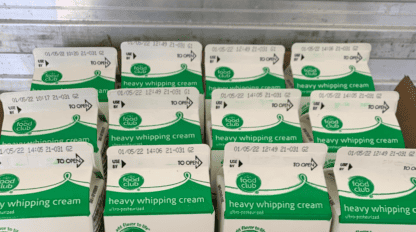Smart Shopping: Planning ahead to minimize food waste

“A goal without a plan is simply a wish.” This quote from French writer, Antoine de Saint-Exupery, sums up how we feel about preventing food waste when grocery shopping. While there are some fantastic improv cooks out there, for most of us, a good meal plan is key to successfully avoiding wasted food. And a “good” meal plan includes room for flexibility because – let’s face it! – life is unpredictable.
The next time you go grocery shopping, try the approach below to help you prioritize using the food you already have in your kitchen and to avoid getting new food that may land in the rubbish bin. It will help you save money on your grocery bill, too, by ensuring you don’t buy anything you won’t actually eat and enjoy.
Take inventory of your kitchen
The best way to prevent wasted food is to use it! So, before you think about acquiring new food, take stock of your pantry, fridge, and freezer and make note of anything you need to use up soon – from bananas going brown to chicken that’s been frozen for a while.
And remember that date labels (sell-by, best-by, etc.) are not expiration dates; they are merely factory recommendations around peak quality. Many foods are safe to eat past the date on their label, but confusion around how these labels work causes about 20% of all wasted food (FDA). To learn more, check out our blog “What You Need to Know About ‘Expiration Dates.’”
Plan your meals
Now that you know which ingredients you want to use up this week, it’s time to pick your recipes. If you need ideas, Food Waste Feast is a good place to start. Here are a few other things to consider while meal planning:
- Utilize substitutions. Why buy almonds when you already have walnuts in the pantry? Unless an ingredient is crucial to a recipe, substitutions can help you consume more of the food already in your kitchen. And they’re perfect for no-fuss weeknight cooking!
- Think about your schedule. Do you have an event later this week that will prevent you from cooking? Running your kids to soccer practice after work? Be practical with yourself about how much time and effort you can spend cooking each night. Choose meals (or plan for leftovers) that will help you get through the week and avoid wasting food.
- Work in flexible meals. Plan for meals with perishable ingredients on nights you know you’ll end up cooking. For days where your schedule feels less certain (like the weekend, maybe), plan for meals that use non-perishable items from your freezer and pantry. That way when you get a Friday afternoon “Want to meet for dinner after work?” text, you can give a guilt-free “Yes!” because meals dependent on freezer and pantry ingredients have a longer shelf life. If you don’t cook that meal that night, you have time to get to those ingredients later.
Make your grocery list and stick to it
Once you have your meals picked out, make your grocery list and stick to it when you get to the store. Fun, eye-catching produce displays are tempting, but resisting the urge to buy items you didn’t plan for will help you avoid buying more food than you can consume.
And that’s it! If you’re not already a meal planner, remember to be patient with yourself. It can take some time to learn what works and doesn’t work for you and your household. As you refine your own planning strategy, you’ll find yourself wasting less and less food (and saving more and more money on your grocery bill).


